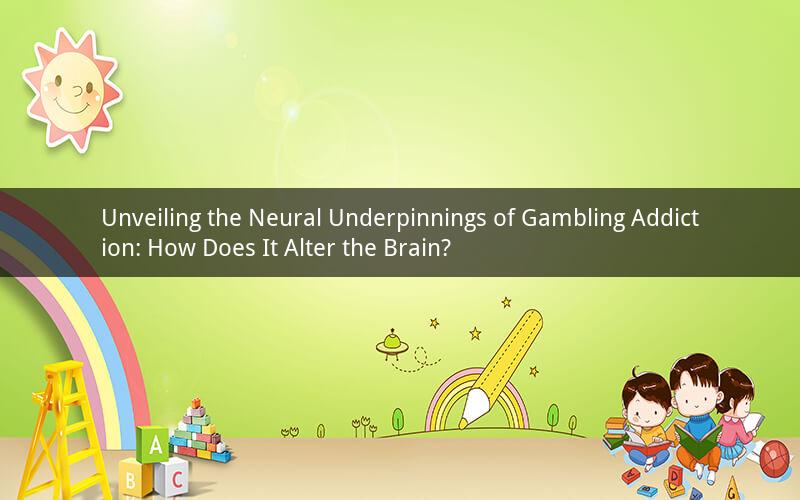
Introduction:
Gambling addiction, often referred to as pathological gambling, is a complex disorder that affects millions of individuals worldwide. It is characterized by an inability to control gambling behavior, despite its negative consequences. While the exact causes of gambling addiction remain unclear, research has increasingly focused on the neural mechanisms underlying this addiction. This article delves into the intricacies of how gambling addiction affects the brain, shedding light on the neural pathways and neurotransmitters involved.
1. Dopamine and the Reward System:
One of the primary neurotransmitters affected by gambling addiction is dopamine. Dopamine is often referred to as the "feel-good" neurotransmitter, as it plays a crucial role in the brain's reward system. When individuals engage in gambling, the brain releases dopamine, leading to feelings of pleasure and reinforcement. Over time, the brain becomes accustomed to these heightened levels of dopamine, leading to a heightened desire for gambling and a higher risk of addiction.
2. The Nucleus Accumbens:
The nucleus accumbens, a region located in the forebrain, plays a pivotal role in the reward system. It is heavily involved in the processing of rewards and reinforcement. In individuals with gambling addiction, the nucleus accumbens becomes hyperactive, leading to an increased sensitivity to rewards associated with gambling. This heightened activity in the nucleus accumbens contributes to the compulsive nature of gambling addiction.
3. Prefrontal Cortex and Decision-Making:
The prefrontal cortex, located in the frontal lobe of the brain, is responsible for decision-making, impulse control, and self-regulation. In individuals with gambling addiction, the prefrontal cortex often shows alterations in its function. This region becomes less active during gambling, leading to a decreased ability to inhibit impulsive behaviors and make rational decisions. Consequently, individuals with gambling addiction may engage in excessive gambling despite the negative consequences.
4. Brain Imaging Studies:
Advancements in brain imaging techniques have provided valuable insights into the neural alterations associated with gambling addiction. Functional magnetic resonance imaging (fMRI) studies have shown that individuals with gambling addiction exhibit altered activity in various brain regions, including the nucleus accumbens, prefrontal cortex, and insula. These alterations in brain activity contribute to the compulsive nature of gambling addiction and the inability to control gambling behavior.
5. Treatment and Intervention:
Understanding the neural mechanisms of gambling addiction is crucial for developing effective treatment and intervention strategies. Cognitive-behavioral therapy (CBT) has emerged as a prominent treatment approach for gambling addiction. CBT aims to address the cognitive and behavioral aspects of addiction, helping individuals develop healthier coping mechanisms and improve their decision-making abilities. Additionally, medications targeting neurotransmitter systems, such as dopamine receptors, have shown promising results in reducing gambling冲动.
FAQs:
1. How does gambling addiction affect the brain's reward system?
Gambling addiction alters the brain's reward system by increasing the release of dopamine, leading to heightened sensitivity to rewards associated with gambling. This heightened sensitivity contributes to the compulsive nature of gambling addiction.
2. Can gambling addiction be treated?
Yes, gambling addiction can be treated. Cognitive-behavioral therapy (CBT) is a widely used treatment approach that focuses on addressing the cognitive and behavioral aspects of addiction. Additionally, medications targeting neurotransmitter systems have shown promise in reducing gambling冲动.
3. Are there any genetic factors contributing to gambling addiction?
Yes, genetic factors can contribute to the development of gambling addiction. Research suggests that certain genetic variations may increase an individual's susceptibility to developing gambling addiction.
4. Can brain imaging techniques help diagnose gambling addiction?
While brain imaging techniques cannot diagnose gambling addiction on their own, they can provide valuable insights into the neural alterations associated with addiction. These techniques can aid in understanding the underlying mechanisms of gambling addiction and guide treatment approaches.
5. How can individuals support someone struggling with gambling addiction?
Supporting someone with gambling addiction involves providing empathy, understanding, and encouragement. Encouraging them to seek professional help, such as therapy or support groups, can also be beneficial. It is important to approach the situation with patience and understanding, as recovery can be a challenging process.